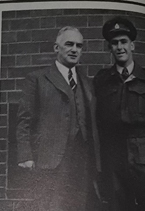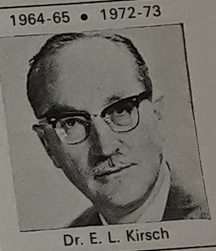When Hitler’s forces attacked Poland on 1st September 1939, Britain declared war on Germany. The following week the G&SPHC committee agreed to postpone indefinitely the question of building a communal hall about which they had been hemming and hawing and continued to hire the Adelphi Hall which they agreed to let to the Red Cross on Friday evenings and allowed German Jewish refugees to use it for recreation and cultural purposes but not for card playing.[i] (When the lease expired in December 1940, they did not renew it despite requests from the Red Cross, Habonim and the Jewish Guild asking them to change their mind.)
It was touch and go whether South Africa would declare war too. Prime Minister JBM Hertzog, the leader of the pro-Afrikaner anti-British National Party, wanted to remain neutral. General Smuts, the leader of the pro-British United Party, wanted to enter the war.
Smuts won by the narrow margin of thirteen votes - 80 to 67. As many Afrikaners were antisemitic, had close ties to Germany, and were anti-Britain, conscription was never an option and the army depended entirely on volunteers. To the Jewish community the war against the Nazi Government was imperative. They had no doubt about the necessity of fighting, and the importance of defeating Hitler as soon as possible in order to rescue their fellow Jews. The Jewish Board of Deputies “pledged that the Jewish Community would do all in its power to assist the Union and its Allies in their fight for victory”.[ii] The MOTHS Jews and Christians Shell hole in Cape Town immediately started recruiting, visiting the large Jewish firms in Cape Town and making speeches at socials, meetings and parties.[iii]
Major Gluckman gave his address to the shul from the steps of the ark.[iv] Many shul members joined up. Former president AE Abrahams left for active service up north where he would be taking charge of 10,000 Polish refugees. A resolution was passed at the 1942 AGM that Dr Ivan Waynik, who joined the congregation in 1936, would remain a committee member while he was on active service. It was also agreed that discretion should be used by the seating committee in every individual case regarding men on active service and their wives.[v] When the congregation learnt that the sons of NW Herberg and HA Swiel, brave Flying Officers, had been reported missing, letters were sent to the families praying that they would receive reassuring news of them before long.[vi]

Morris Robinson with his son Norman in uniform
In his memoirs, written in December 1942 while serving in Egypt, Dr Waynik stated that before war was declared he offered his services although he was 39 with a big practice. He believed that it was not a matter of patriotism for Jews, it was a fight for their very existence and should not be a matter of 10% or 15% of the Jews joining up, it should be a matter of 100% of every able-bodied man. All their resources, every penny they had should be put at the disposal of the Government. He felt he should give a lead to the community, for it was a fight for his honour, his right to live for himself, his wife and child. The Saturday before leaving to join the army he went to the synagogue and offered a prayer and bade goodbye to his 80-year old father who made him promise not to smoke on Shabbat and he kept his word. Dr Waynik was very downhearted when his father died before he could be notified. “I went into my tent, offered a prayer and returned to my duty.”[vii]
Dr Kirsch, who had celebrated his barmitzvah in the shul, enlisted in the Cape Town Highlanders, where he was taken prisoner at Gazala in North Africa, having sustained severe injuries to his foot. He was repatriated in 1943 and was twice elected G&SPHC Shul President.[viii]

Once war broke out, war work took priority over individual fundraising although they did agree to buy a vacuum cleaner and install a power plug (27.2.1941). War broke out the week before Sally Oboler was due to get married to Sam Krawchuk at the Marais Road Shul on 24th October 1939. All receptions were cancelled and the reception was moved to their home in Cassel Road. Dolly Zieper and Betty Herman started the Ladies Work Party. They raised funds, collected, sewed and knitted clothes, socks, scarves and balaclavas for the soldiers.[ix] (By the end of the war there were 33 work parties in Cape Town involved in knitting, sewing and collecting gifts and comforts for the soldiers.[x]) They gave generously to the SA Jewish War Appeal which was sending money and parcels of food, clothing and medicine to the refugees released from the concentration and extermination camps and living behind barbed wire in displaced persons camps and, with the establishment of the State of Israel in 1948, to the new immigrants flooding in destitute. [xi]
All Jewish women’s organisations helped the SA Women’s Auxiliary Services to co-ordinate the entertainment of convoys, organise functions for them at the Zionist Hall and provide comforts for the soldiers. Many of the Australian, New Zealand or British army and navy personnel passing around the Cape in military convoys came to the shul on Fridays and Saturdays and were taken home for a meal and a brochah.[xii] When the Second World War began, all individual fund raising was put on hold as attention went to supporting the war effort. The ladies’ committee, like the other women’s groups, became involved in the SA Women’s Auxiliary Services helping to provide comforts for the soldiers.[xiii]
Appeals for funds started arriving, and the synagogue was a very generous contributor to the South African Jewish War Appeal. When the Chief Rabbi in London wrote to ask for funds for refugee rabbis in London, ten guineas were sent (4.4.1940). When he wrote to ask for money to plant a forest in Palestine in the name of the Chief Rabbi, £20 was sent (29.4.1943) but when another letter arrived asking for funding for a mobile synagogue, they responded that the Board of Deputy’s war executive had cabled the Chief Rabbi asking him to please stop sending those appeals as South African Jewry was attending to its own national matters (26.10.1944). Enough was enough. The committee had even considered economising by stopping the custom of distributing chocolates on Simchat Torah – in the end they decided to substitute slabs for boxes (1.10.1944). The Cape SA Jewish Board of Deputies has in its collection the chocolate boxes of the Maitland Synagogue (1934) and Woodstock & Salt River Hebrew Congregation (1940) – both have photographs of the synagogue on the lid - a slab would certainly be cheaper than a specially printed box.
[i] G&SPHC Minute books, 7.9.1939; 2.5.1940, 6.12.1940
[ii] Saron, Gus, “Four Eventful Decades”, IN The South African Jewish Board of Deputies, The Story of Fifty Years 1903-1953, reprinted from Jewish Affairs, 1953, 20
[iii] South African Jews in World War 11, The South African Jewish Board of Deputies, Johannesburg, 6
[iv] G&SPHC minutes, 5.9.1940
[v] G&SPHC minutes, 30.7.1942, 28.3.1943, 27.4.1941
[vi] G&SPHC minutes, 28.12.1944
[vii] Waynik, Dr I, unpublished typed memoirs in the possession of his daughter, Dr Jill Lazard, 59-60, and 70
[viii] Zieff, Sol, “Ernie Kirsch - An appreciation “, Rosh Hashana G&SPHC, 5761, 22
[ix] Segal, Shirley, “The Sea Point Synagogue Ladies’ Guild”, G&SPHC Rosh Hashana Annual Golden Jubilee 1983-5744, 67
[x] Kirsch, Sonia, “The War & I”, G&SPHC Rosh Hashana Annual, 2001 - 5762
[xi] By the end of the war there were 33 work parties in Cape Town involved in knitting, sewing and collecting gifts and comforts for the soldiers. Much of the clothing they made themselves. The Bnoth Zion Association had sewing groups convened by Fanny Gross whose husband became G&SPHC president in 1968-1969. In 1946 there were 17 such groups. President AM Jackson commented that they made thousands of garments for children in Israel. Some years later at the request of Israel the work was discontinued due to the high cost of transport and the need for clothing having been met. The Ladies Work Party continued working for Israel and also established the Ezra Maternity Ward.
[xii] Newman, Abe, “A special memoir”, G&SPHC Rosh Hashana Annual, 2017-5778, 49
[xiii] The Zionist Hall was used to host functions to feed and entertain the convoys of soldiers. Meryl Myers said she could still smell the bacon she had to serve to the visiting soldiers when it was her turn to help out with breakfasts.
